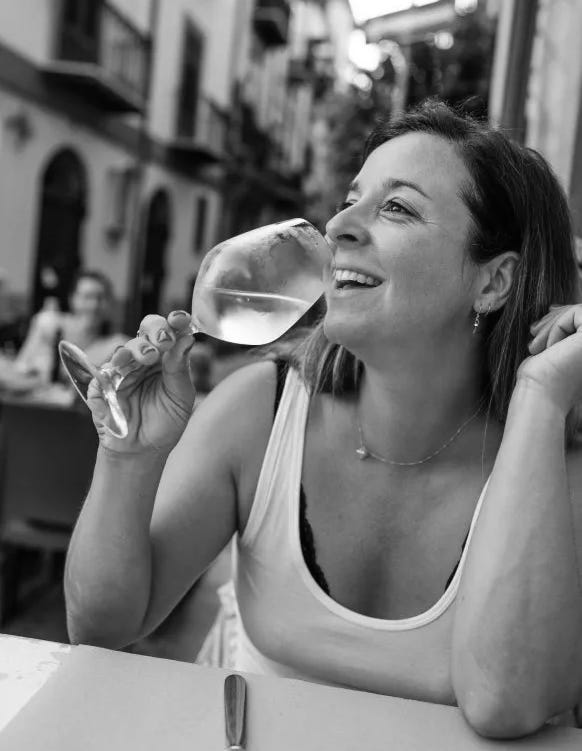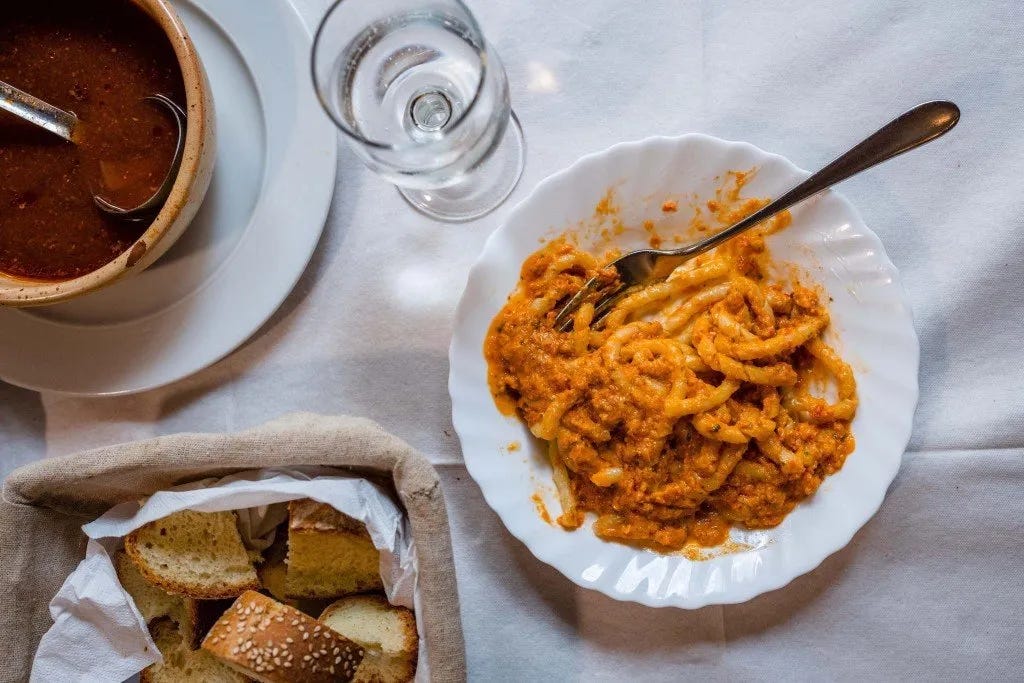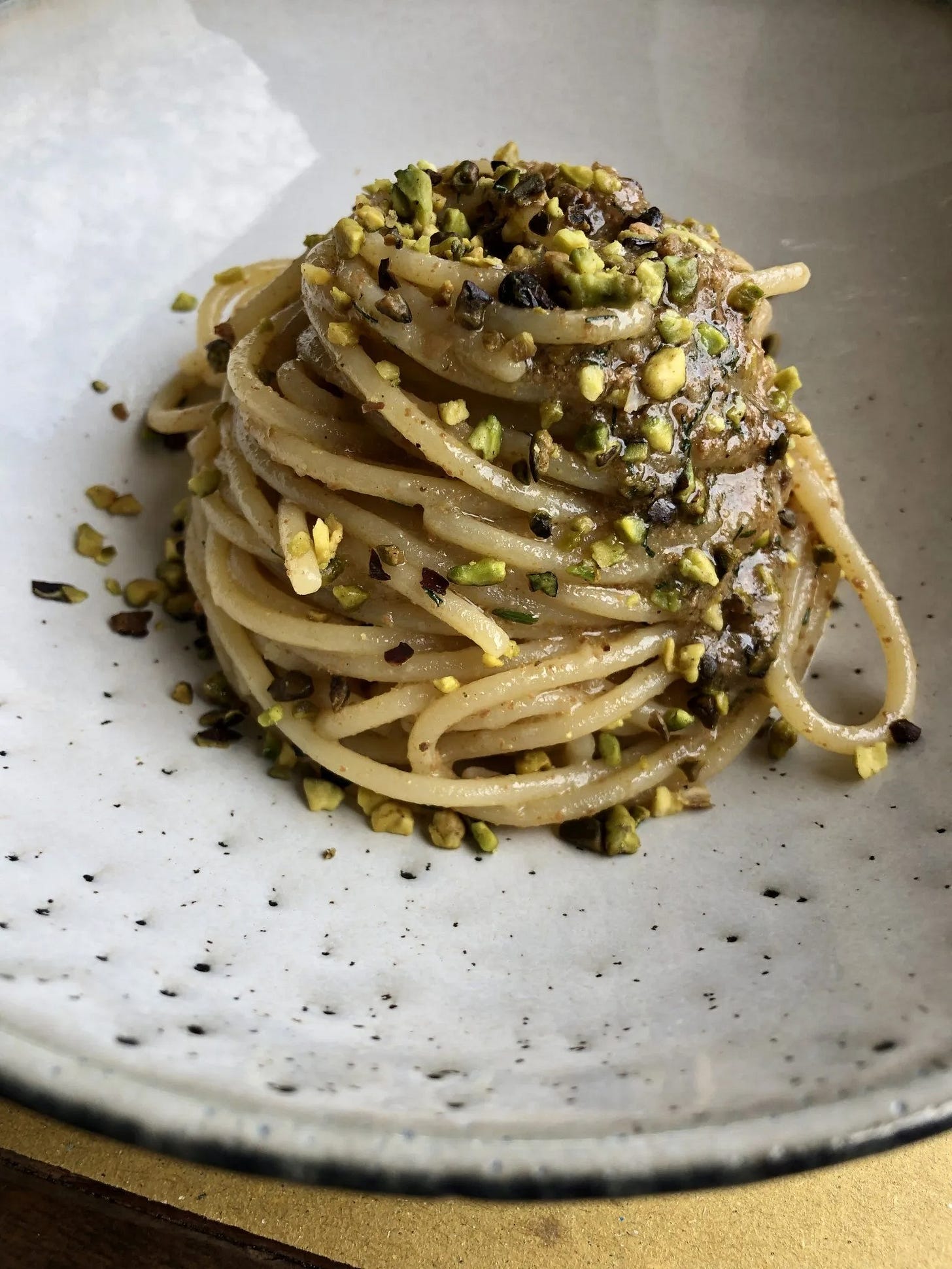Katie Parla doesn't think all food in Italy is good
But that's the point of her writing. Our conversation on Italian food culture, cookbook writing, and her publishing company.
If you enjoyed this post, head to the bottom of the page to like or comment so others can find it. Thank you!
Katie Parla is a Rome-based food and beverage writer, culinary guide, and cookbook author. Originally from New Jersey, she moved to Italy over two decades ago and has since written, edited, or contributed to more than 35 books (9 of them cookbooks).
Her latest book, Food of the Italian Islands was published last year, and with it, she also started a publishing company to help other writers get their books into the world.
I chatted with Katie about Italian food culture, her path to writing cookbooks, and her publishing company.
Brianna Plaza: Can you tell me about your background?
Katie Parla: I'm originally from New Jersey and I grew up in a restaurant family there. I was always very interested in food and hospitality, and I always worked front of house in restaurants. I moved to Italy in 2003 with an art history degree with this all encompassing obsession with food.
My Italian really sucked at the time, so I took a sommelier certification course because it felt low stakes. What if I failed? Big deal. I really enjoyed it and it helped me a lot with my Italian fluency. I was like, I like talking about art, but maybe I'll also talk about wine. Then that led to a Master's in food history, which led to writing about food.
Although I love food and food culture, I don't want a restaurant. I’ve developed this career in Italy where I can work in these different facets of the food world and engage directly with people. I write with the idea that artisanship in Italy is something that is special and rare, and that tends to drive my choices in the subjects that I write about.
Brianna Plaza: How have you seen Italian culture change since you've arrived?
Katie Parla: I moved there just over 21 years ago, and there have been major cultural shifts and major economic crises. Italy is largely middle class and we don't have the abject poverty that is the reality in the United States. But that middle class disposable income that would generally be spent on travel and food has been eroded. That means people are either more inclined to go the absolute budget route, or they save what they can to invest in quality products.
Even though a lot of people are kind of in the same boat, it's created this dichotomy. We can eat the worst quality products that we've ever had access to in Italy, and also some of the best quality products. This is why I think one of the main theses of my work is not everything in Italy is good.
The Italian brand is a powerful marketing tool, which means it's even more important to spend time getting to know the producers who are really devoted to making great food and not just relying on various phrases and marketing ploys to get people to buy their stuff.
Brianna Plaza: How did you start writing cookbooks?
Katie Parla: I sold my first cookbook in 2014, but I had been writing about food for years. I was writing about the way that the 21st century and late 20th century food culture in Rome had changed as the food evolved. I didn’t really see acknowledgment of the innovations that were happening, so I just wrote all these articles on the subject. In 2014 I looked at this body of work and I was like, this might be a book.
I wasn’t writing recipes at the time so I had to figure out how to write a cookbook. Nobody tells you anything, they just give you money and they’re like “We’ll see you in a year.” And then they write to you and they’re like, “Actually, can you submit the manuscript three months earlier?”
It was baptism by fire. That book became Tasting Rome, and immediately my publisher had another book, which became Food of the Italian South. I’ve now just finished my ninth cookbook. My career has been a mix of writing my own solo titles and writing books for other chefs. I’ve really honed that middle-aged male chef voice.
Brianna Plaza: If you weren’t writing recipes, why were cookbooks the next logical step?
Katie Parla: I was always very interested in all the ways you could communicate with food. In 2014/2015, I was working 20 hours a day — and that’s not an exaggeration. I never had the time or space to incorporate kitchen time into the other research that I was doing.
I like exploring new types of media that I’ve never done before. I’d developed my own travel and dining apps. I created ebooks. I thought, what a cool experience for the world and have people interact with recommendations. I was always experimenting and not all of my experiments stuck, but the cookbook thing did.
I’ve now founded founded my own publishing company so I can help other writers. I want to have authors write the book and then I help them do everything else. I want to help manage the editing, graphic design, photography, having it printed for them, helping them with the logistics, and marketing. Over the course of a decade, I've figured it all out through a lot of trial, but mostly error.
My career has been a mix of writing my own titles and writing books for other chefs. I’ve really honed that middle-aged male chef voice.
Brianna Plaza: Tell me a bit more about the publishing company.
Katie Parla: There are a handful of publishers that own almost all of the publishing in the world, and so I could never be a competitor to any of those. My objective is to help people realize their goals in creating a book.
I'm very much from the classic school where you analyze sales and then based on the sales, that determines whether you're worth anything. That's a really gross way to characterize a piece of writing, but I'm still trying to break myself from it because it does dominate the industry.
Many writers don't care if they sell 500 or 50,000 books. They would just love to give books away to their guests who have been with them for 30 years or want something that they can hold that feels permanent.
I would say that I'm not actually a publisher. I'm more of a consultant that is assisting the process on every level.
Brianna Plaza: You’ve published a number of Italian cookbooks, but you’re not from Italy. How did you decide which direction to go?
Katie Parla: There are 61 million opinions which is coincidentally identical to the Italian population. Authenticity is a very loaded word, but I also find it a useful word because it can come from when community agrees upon a certain number of standards.
If people in a village near Benevento have all decided that certain ingredients are stuffed inside a horn shaped pepper, those are authentic Benevento-style peppers. If you freestyle it with some other random stuff, it's no longer authentic.
I try to balance these ideas. I really see value in hearing what people tell you about themselves and their community, but then also their documents that can rebut a claim of whatever authenticity happens to be.
Take carbonara, for example. Every Roman that you talk to will say that since time immemorial, people have been making carbonara with only egg yolks, guanciale, spaghetti or rigatoni, black pepper, and Pecorino Romano. But if you look at the first published recipes, there's butter and garlic and all sorts of stuff that makes people lose their minds if you suggest it.
I think when I'm writing about a topic, especially one that looms large like carbonara, I like to take that as an opportunity to dissect what people are telling us. I use that as a platform for explaining a larger truth about cooking in Rome: the fact that it is constantly evolving. People sometimes forget what was done before making the current “authentic” version.
Brianna Plaza: How has your work been received as an American writer in Italy?
Katie Parla: Based on my website analytics and book sales, I have a pretty decent Italian following. Probably 20% of my site traffic is from Italy. A lot of my books have been translated into other languages, including Italian.
How has it been received? It depends on when the thing was written. The Italian publisher that published my Tasting Rome book hasn’t bothered to update in 10 years. People who read it are like, "This person's an idiot. This is all out of date, this place closed.”
People who actually follow my documenting of Italian gastronomic culture in real time have nothing but appreciation for what I'm doing. Many of the places that I write about haven't really been addressed in a significant way. People are happy about it as long as I don't say that I like pineapple on my pizza (even though I really do, as long as there's no tomato sauce on it).







Katie Parla is my north star of Italy dining—I will do whatever she says. Thanks for this interview, loved it!
Great interview! It’s true, there are some cheapo shortcuts happening but luckily the Italian food culture is strong so they can be easily avoided with a little local know-how. (Obv Katie’s that local in Roma 😉)